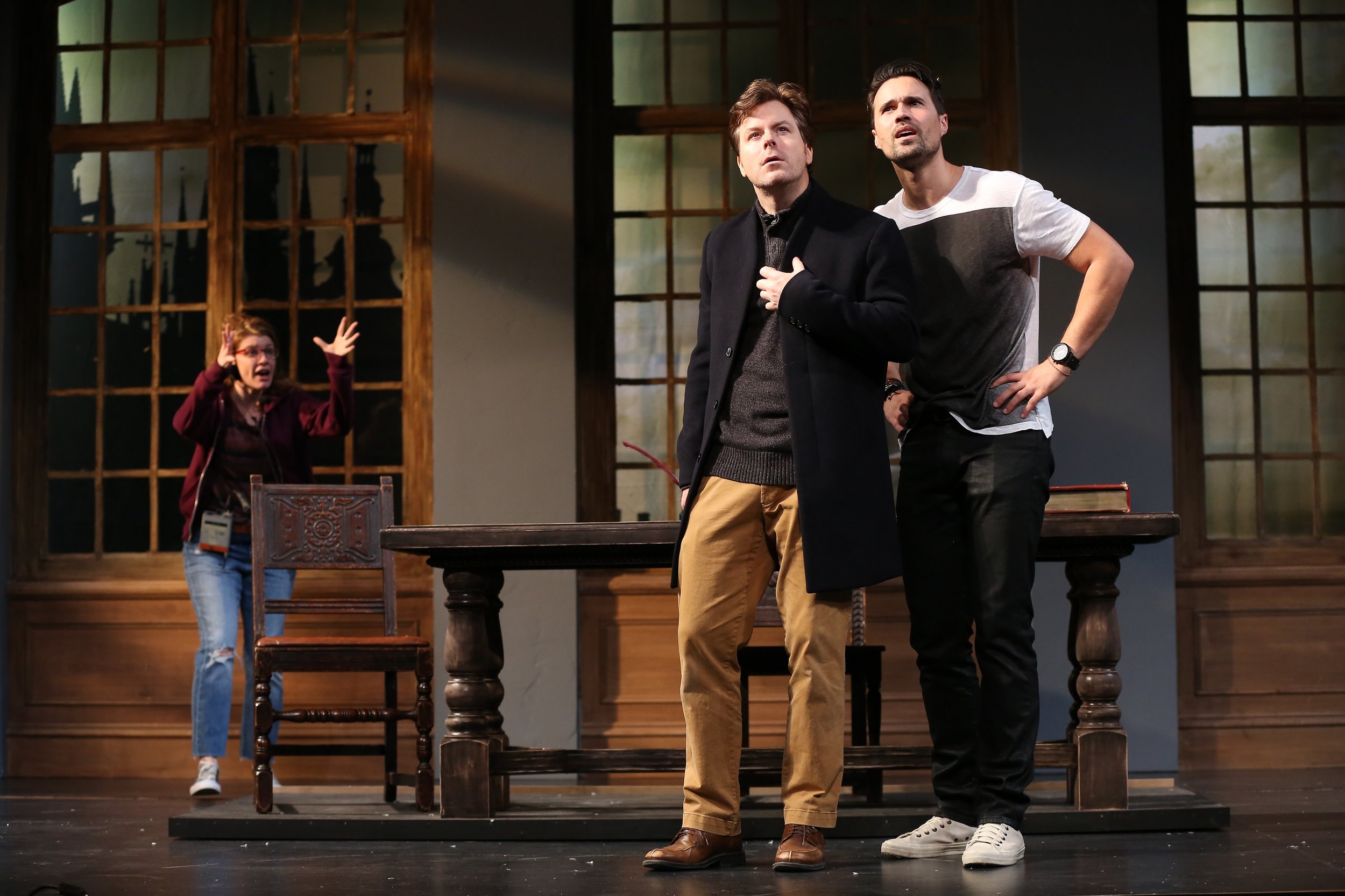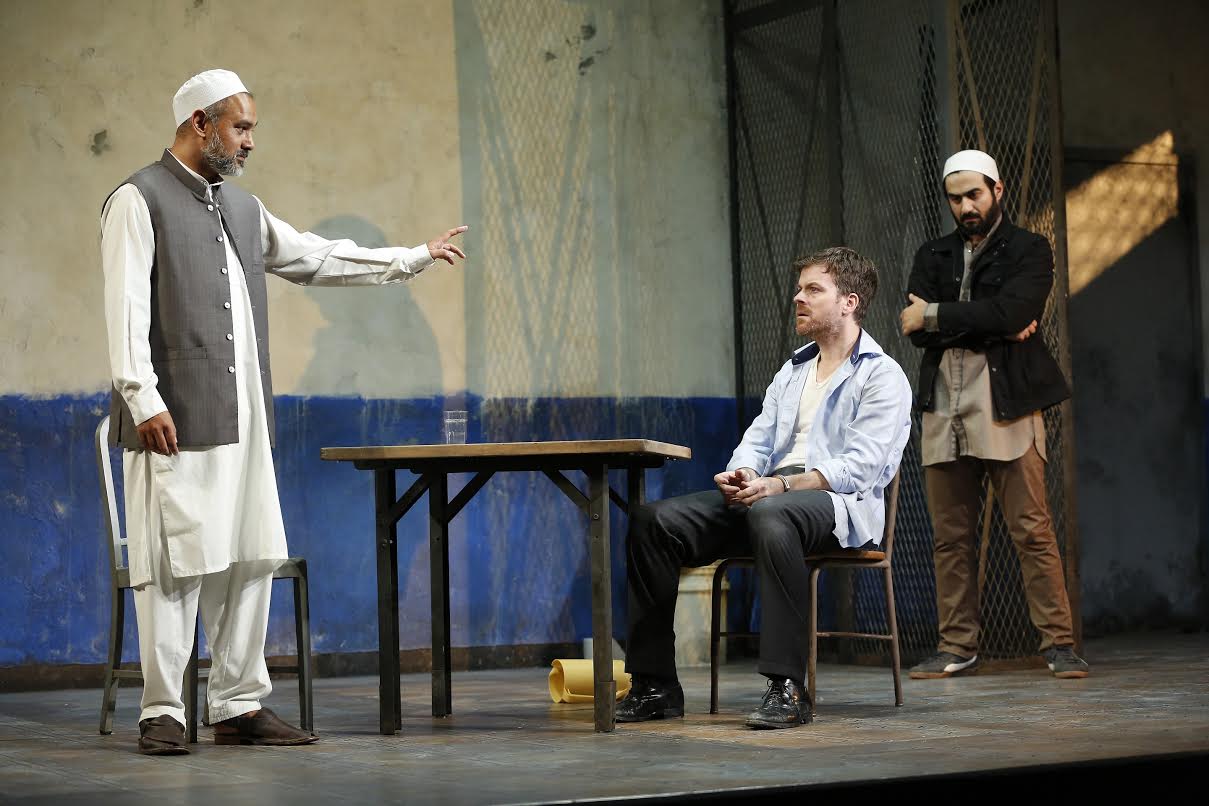Review of The Understudy, Westport Country Playhouse
Once again, Westport’s co-artistic director David Kennedy has found a notable play to direct. Theresa Rebeck’s multivalent comedy The Understudy has entertaining fun with theater, show-biz, romantic comedy, and Kafka. Kennedy’s direction weaves together the various levels of the play’s action in a very engaging way, keeping before us the play’s main contention: theater is the existential art par excellence.
The play opens with a bang, literally, as Harry (Eric Bryant), the titular character, storms into the theater shooting off a prop gun, threatening the audience to turn off their damn cell phones (with good reason: let’s compare most egregious cell phone disruption at a play). Harry, as he proceeds to tell us, is a respectable actor who has taken on the role of understudy in a theatrical version of Franz Kafka’s unfinished novel The Castle, which—in the play’s fiction—is playing on Broadway. The Kafka play stars a Hollywood action hero known only as “Bruce” whose “quote” for a film is upwards of $22 million. We never see him.
Roxanne (Andrea Syglowski), Harry (Eric Bryant), Jake (Brett Dalton) (photos: Carol Rosegg)
The other actor in the show, who will have to go on for Bruce if he should be absent for some reason, is Jake (Brett Dalton), an up-and-coming (he hopes) film actor, far below Bruce in pecking order, but far above Harry. As it’s explained at one point, in Shakespearean terms, Bruce is Richard III, Jake is Henry V, and Harry is seventh spear carrier. Harry, in fact, missed getting a small part in the disaster film that Jake is currently starring in. Its breakaway line—“Get in the truck!”—gets a lot of comic mileage.
Harry will understudy Jake, so that if Jake has to take Bruce’s part—which is a multi-character role, basically every character but the protagonist—Harry will take Jake’s. Helping along this percolating male rivalry, and at times aghast at it, is Roxanne (Andrea Syglowski), the beleaguered Stage Manager. She’s very good at her job, but her emotions get involved because—the romantic comedy aspect—she and Harry have history. He jilted her.
Jake (Brett Dalton), Roxanne (Andrea Syglowski), Harry (Eric Bryant)
That romantic subplot gives considerable status to Roxanne and lets Syglowski run away with a number of scenes. She’s very good at playing sarcasm, emotional explosion, and self-conscious irritation, all in the same speech. The romantic comedy elements work into the actors’ one-upmanship quite well, particularly with the staging of kiss before or after slap.
Roxanne’s distress is what makes real-life messiness impinge on the make-believe of the theater and the “can you believe it” of show biz. The earning ability of pointless, barely entertaining movies, and the money and power of those who star in them, is the source of Harry’s bitterness, and Bryant is generally entertaining in putting across Harry’s realization that, in terms of the star system, he’s wasting his life and his talent and is a nothing. His failure with Roxanne shows that he’s not even very good at starring in his own life. Cue Kafka.
Kafka is a dead writer with considerable hipster cred—virtually unknown and mostly unpublished in his lifetime, he’s now a household word (well, in literate households), his name synonymous with a state of modern anomie in which the experience of living is a kind of purgatory of dread and uncertainty, marked by the creeping suspicion that all decisions and actions—and the success or failure they entail—are arbitrary in an arbitrary world. For some must understudy whilst some must star, and so runs the world away.
One of the play’s easy jokes is that a three-hour play derived from Kafka would be a hit on Broadway if only an actor with Bruce’s instant recognizability would take part. We may be reminded of unlikely hits in which a similar casting coup carried the day, and that’s the point. Very capable actors find themselves earning “real money” as minor characters in Law and Order, while big name actors can make or break plays beyond their skill set.
Which puts the focus on Jake. Assumed to be an unintelligent, talentless success by Harry, Dalton’s Jake is an acting enthusiast as only a fan boy can be. He speaks of Kafka with the kind of relentless admiration generally reserved for Dr. Who or Star Trek. He makes the telling point that the $2 million he received for the disaster epic “doesn’t go very far,” when you consider how much money has to be shelled out to keep his circus running. Theater is always precarious, but perhaps more precarious is remaining “A-list”—even more precarious is trying to break into that world, as Jake hopes to do.
Jake (Brett Dalton), Roxanne (Andrea Syglowski), Harry (Eric Bryant)
At Westport, a key comic element works well. Up in the booth is Laura, Roxanne's assistant, seemingly a stoner who misses cues, won’t take direction, and switches scenery unasked. She’s a kind of demented god in the machine, cueing the Kafka play’s sets and making The Castle—our play is supposedly a run-through rehearsal—pursue its arc, from bar-room to trial room to prison cell, letting each change contribute to the exchanges among the trio. The changes let us know not only where we are in the shambles of a rehearsal but also where we are in terms of The Understudy’s own arc. One of the underlying perks of The Understudy is that any given production gets to determine how a “Broadway play of The Castle” might look and sound. Andrew Boyce’s scenic designs, complete with Disneyesque castle backdrop, Matthew Richards’ lighting design, and Fitz Patton’s sound design, with Kennedy’s direction, almost make us wish the play were real. The delightful “old soft shoe” in the conclusion is a suitably existentialist gesture, as in Kafka meets Chaplin.
Not everything in the script is as sharp as it could be. The use of fortuitous exits and of the oft-stated and just as oft forgotten fact that everything said on the stage can be heard throughout the building at times forces action or revelation in highly scripted ways. But even that is not without charm, since Rebeck’s working conceit is that life has its “cues” and its “reveals” in ways that seem to be part of a play. The Kafkaesque sense that our lives may be rehearsals for a part we never get to play (see “Before the Law”) underscores The Understudy with understated irony. Life is so unfunny all we can do is laugh at it. Amusing theater helps.
The Understudy
By Theresa Rebeck
Directed by David Kennedy
Scenic Design: Andrew Boyce; Costume Design: Maiko Matsushima; Lighting Design: Matthew Richards; Sound Design: Fitz Patton; Choreographer: Noah Racey; Fight Director: Michael Rossmy
Cast: Eric Bryant, Brett Dalton, Andrea Syglowski
Westport Country Playhouse
August 14-September 1, 2018




